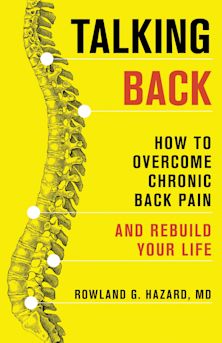The Brain Behind Pain
Exploring the Mind-Body Connection
The Brain Behind Pain
Exploring the Mind-Body Connection
Description
Explores the important role of the brain in both the experience of pain and its resolution.
Pain is a product of the brain, which announces it after being warned by a small army of nocioceptors stationed throughout the body, always on alert for any threat to the overall system. But there can be glitches in that process. Chronic pain often occurs when the brain "remembers" pain, even though the condition that caused it may have been dealt with and resolved. Still, pain is misunderstood by many, including both sufferers and the physicians they seek out to treat it. In recent years, though, new light has been shed on just what causes pain, how it is experienced in the body, how it can go haywire, and how it can be resolved. Pain may no longer be just a symptom of some other malady. In some cases, it becomes a condition all to itself.
Here, Dr. Akhtar Purvez, a seasoned physician dedicated to the study and treatment of pain, offers a comprehensive view of how chronic pain is felt, transmitted, and modified by the nerves and the brain. He explores the interplay of the physiological, anatomical, and emotional aspects of pain in addition to the mental health aspects, cultural differences, and the role of addiction in pain sufferers. Alongside this enlightening overview, Dr. Purvez provides hope to readers as he details ways of treating pain and the new approaches that are becoming available. We all experience physical pain at some point in our lives, but no longer does it have to rule our lives or impact our functioning or overall wellness if we can find the right ways to understand and treat it. This work is the starting point.
Table of Contents
A look at how humans have studied and tried to ward off the mysterious and universal phenomenon
of pain over the centuries, from the ancient Egyptians and Greek scholars through the beginnings of
Arabic medicine, the philosophy of Rene Descartes, and modern explorers such as Ronald Melzack.
CHAPTER TWO: THE BODY'S CEO
This chapter examines some of the many things the brain can do (and how science has regarded it),
focusing on the brain-pain connection.
CHAPTER THREE: PAIN IN OUR CULTURE
How pain has infiltrated not only our bodies, but our cultural attitudes toward it.
CHAPTER FOUR: ALL THE HURTFUL THINGS
What hurts us the most? An examination of some of the pain's many manifestations and vehicles.
CHAPTER FIVE: CHASING RELIEF
The history of pain relief, from ancient remedies to modern innovations.
CHAPTER SIX: HOW CHRONIC PAIN CHANGED THE GAME.
Examines ways in which medical science has been forced to battle a different (and often baffling)
subset of pain.
CHAPTER SEVEN: BEWARE THE EVIL TWIN
Delves into the modern scourge of addiction to painkillers.
CHAPTER EIGHT: ANOMALIES
Describes two curious off-shoots of human pain, masochism and congenital insensitivity to pain.
CHAPTER NINE: WITH PAIN IN MIND
The mental health aspects of pain and how research in that direction ay change the face of
treatment.
CHAPTER TEN: THE ROAD AHEAD
A survey of some of the more promising treatment options in the fight against pain.
Product details
| Published | Dec 06 2022 |
|---|---|
| Format | Ebook (Epub & Mobi) |
| Edition | 1st |
| Extent | 252 |
| ISBN | 9781538172810 |
| Imprint | Rowman & Littlefield Publishers |
| Publisher | Bloomsbury Publishing |
Reviews

ONLINE RESOURCES
Bloomsbury Collections
This book is available on Bloomsbury Collections where your library has access.


































